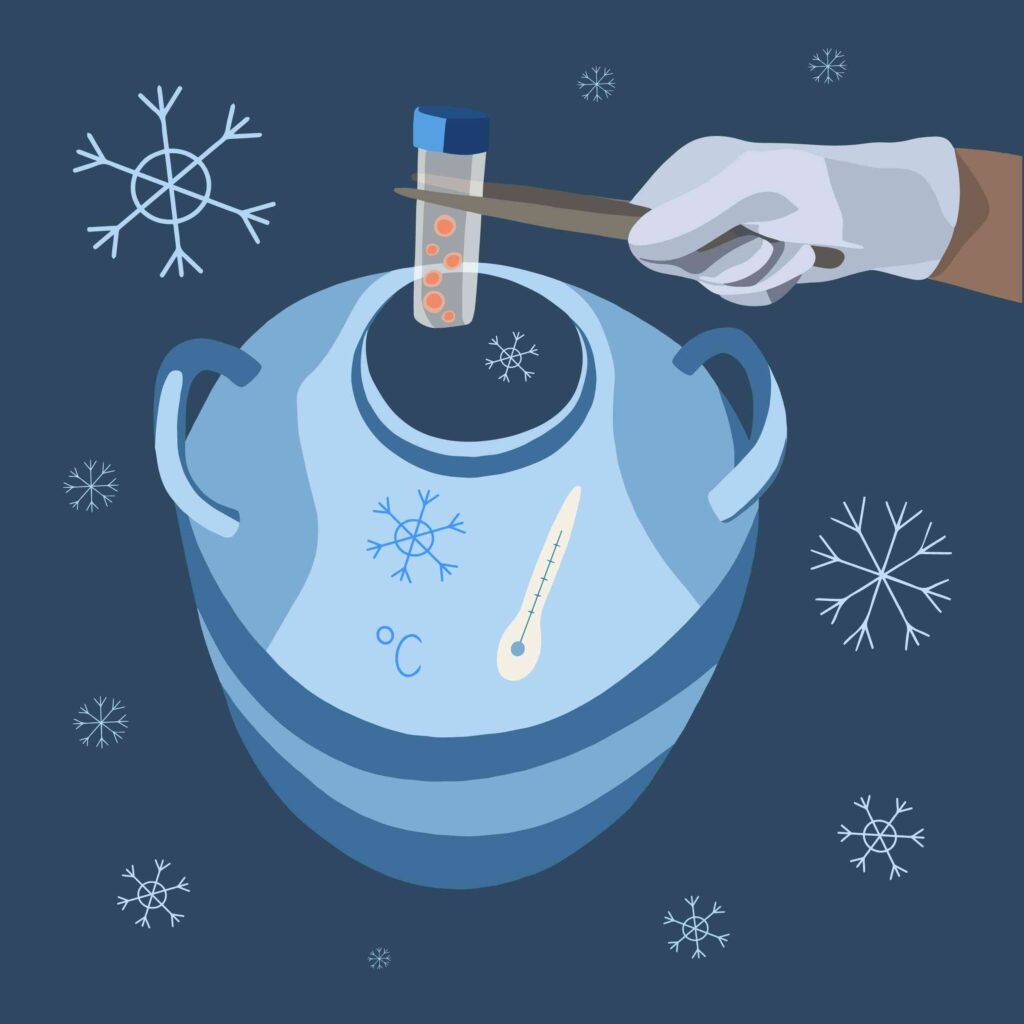Egg Freezing: Myths vs. Facts
In a world where career goals, personal growth, and relationship timelines don’t always align with the biological clock, egg freezing has become a buzzworthy option for women who want to take control of their fertility. You’ve probably heard about it from a friend, a celebrity, or maybe you’ve seen it on a TV show where the plot twists around fertility struggles. But let’s be honest—there’s still a ton of confusion out there. Is it only for older women? Is it painful? Is it even successful?
This post is your go-to guide for separating fact from fiction when it comes to egg freezing. So grab your coffee or tea (or wine—we’re not judging), and let’s talk about what’s real, what’s exaggerated, and what you absolutely need to know before making a decision.
What Is Egg Freezing?
Before diving into the myths and truths, let’s get the basics out of the way. Egg freezing, medically known as oocyte cryopreservation, is the process of extracting a woman’s eggs (oocytes), freezing them, and storing them for future use. It’s typically done to preserve fertility, allowing a woman to try for a baby later using her younger, presumably healthier eggs.

The process involves hormone injections to stimulate the ovaries, monitoring via ultrasounds and bloodwork, and a short outpatient procedure to retrieve the eggs. Those eggs are then frozen using a process called vitrification—a super-fast freezing technique that prevents ice crystals from forming and damaging the egg.
Now that we’ve got the foundation, let’s bust some myths.
Myth #1: Egg Freezing Is Only for Women in Their Late 30s or 40s
Fact: The earlier you freeze, the better your chances
It’s a common misconception that egg freezing is something you do only when you’re nearing the end of your fertility window. But here’s the truth—egg quality and quantity decline with age. Fertility experts generally recommend considering egg freezing in your late 20s to early 30s if you want the best chance of success down the road.
Freezing eggs earlier typically means the eggs are healthier, which can result in higher chances of a successful pregnancy later. Think of it like saving money in your 20s for retirement—you’re setting yourself up with better odds for the future.

Myth #2: It’s a Guarantee for Future Pregnancy
Fact: Egg freezing increases the chances—but it’s not a sure thing
We totally get it—freezing your eggs sounds like pressing pause on your biological clock. But it’s not a 100% guarantee that you’ll have a baby later. The success of egg freezing depends on multiple factors: your age at the time of freezing, the number and quality of eggs retrieved, how well the eggs survive the thawing process, and the health of your uterus and partner’s sperm (if applicable) when the time comes.
Studies suggest that a woman under 35 who freezes 10-15 eggs has a good chance—somewhere between 50-70%—of achieving a live birth. So while it’s a powerful option, it’s not a sure bet.
Myth #3: The Process Is Extremely Painful
Fact: It’s more uncomfortable than painful
Let’s set the record straight: egg freezing isn’t exactly a spa treatment, but it’s not torture either. The hormone injections can cause bloating, mood swings, or cramping—basically PMS on steroids. But for most women, it’s manageable.
The egg retrieval process itself is done under light sedation or anesthesia. You’re not awake for the procedure, and recovery typically takes a day or two. Most women describe the process as “mildly uncomfortable” rather than painful.
And good news: You won’t need weeks off from work or life. Many women continue working and living their lives while going through the process.
Myth #4: Egg Freezing Is Only for Single Women
Fact: Many women in relationships choose to freeze their eggs
Sure, the media loves portraying egg freezing as a single woman’s Plan B—but that’s not the full story. Many women in committed relationships also freeze their eggs. Sometimes couples aren’t ready for kids due to career moves, personal issues, or just timing. Other times, a woman may want to preserve her fertility independently of her partner’s decisions.
Additionally, some couples facing medical treatments like chemotherapy choose egg (or embryo) freezing as a way to protect future fertility.
So whether you’re single, dating, or married—this option can still apply.

Myth #5: It’s Way Too Expensive for the Average Woman
Fact: It’s pricey, but more accessible than you might think
Okay, let’s talk dollars. Egg freezing isn’t cheap—but it’s becoming more financially accessible. The average cost per cycle ranges from $6,000 to $15,000, and many women need more than one cycle to retrieve a sufficient number of eggs. Then there’s the annual storage fee (usually a few hundred dollars per year).
But here’s what’s changed: More employers are now offering fertility benefits that include egg freezing. Big-name companies and startups alike are jumping on board. Also, some fertility clinics offer payment plans, financing options, or bundled packages that reduce the overall cost.
While it’s an investment, it’s not as financially out of reach as it once was.
Myth #6: You’ll Run Out of Eggs If You Do It
Fact: You won’t go into early menopause
This myth probably comes from the idea that if you take eggs out now, you’ll run out sooner. But your body already “loses” hundreds of eggs every month during your normal cycle. The hormones used in egg freezing just help recruit a few more of those eggs that would otherwise be discarded.
You’re not using up your egg supply unnaturally. The procedure doesn’t impact the timing of menopause or your long-term fertility.
Myth #7: You Should Only Do It If You’re Sure You Want Kids Later
Fact: You don’t need to have your whole life figured out
Let’s be honest—most of us don’t have a crystal-clear roadmap of our lives. And that’s okay. Freezing your eggs doesn’t mean you’re committing to motherhood. It simply gives you more options.
Think of it as a form of reproductive insurance. You might never need it—but it’s there if you do. Many women say that just knowing they have the option brings peace of mind, even if they never end up using their frozen eggs.
Myth #8: All Clinics Are the Same
Fact: Clinic experience and success rates matter—big time
Not all fertility clinics are created equal. If you’re seriously considering egg freezing, do your research. Look for clinics with high success rates, experienced staff, and good patient reviews. You can even ask for their egg thaw success statistics.
Choosing the right clinic can make a big difference in your overall experience and outcomes. Don’t be afraid to shop around or ask detailed questions during your consultation.
Myth #9: Frozen Eggs Don’t Age, So Timing Doesn’t Matter
Fact: Your age at the time of freezing still matters
Here’s something many people don’t realize: It’s not the time between freezing and use that impacts success—it’s your age at the time of freezing that matters most. A 28-year-old’s eggs frozen and used at age 40 have better chances than a 38-year-old’s eggs frozen at 38 and used at the same time.
Once frozen, eggs essentially “pause” in time, but the quality they were at when retrieved doesn’t change. Earlier is often better if you’re planning ahead.

Myth #10: The Whole Thing Is Still Experimental
Fact: It’s a well-established medical process
While it was once considered experimental, egg freezing is now a common and safe procedure. The American Society for Reproductive Medicine (ASRM) lifted the “experimental” label in 2012 for non-medical (elective) cases.
Millions of women have gone through the process globally, and success rates have improved significantly with advances in vitrification technology. It’s no longer fringe science—it’s mainstream reproductive medicine.
Is Egg Freezing Right for You?
That’s the million-dollar question, right?
Here’s the thing—there’s no one-size-fits-all answer. Egg freezing is deeply personal, and what makes sense for one woman may not be right for another. The key is making an informed decision based on facts, not fear or myth.
Talk to a fertility specialist. Ask all the questions. Consider your career, health, financial situation, and personal goals. And then do what feels right for you—not what the media, your friends, or society think you should do.

Final Thoughts
The topic of egg freezing is layered, emotional, and filled with both scientific advancements and societal baggage. But one thing is clear: the more accurate information you have, the more empowered you are to make the best decision for your future.
Don’t let myths cloud your judgment. Take your time, do your research, and remember—you have more control than you think.


